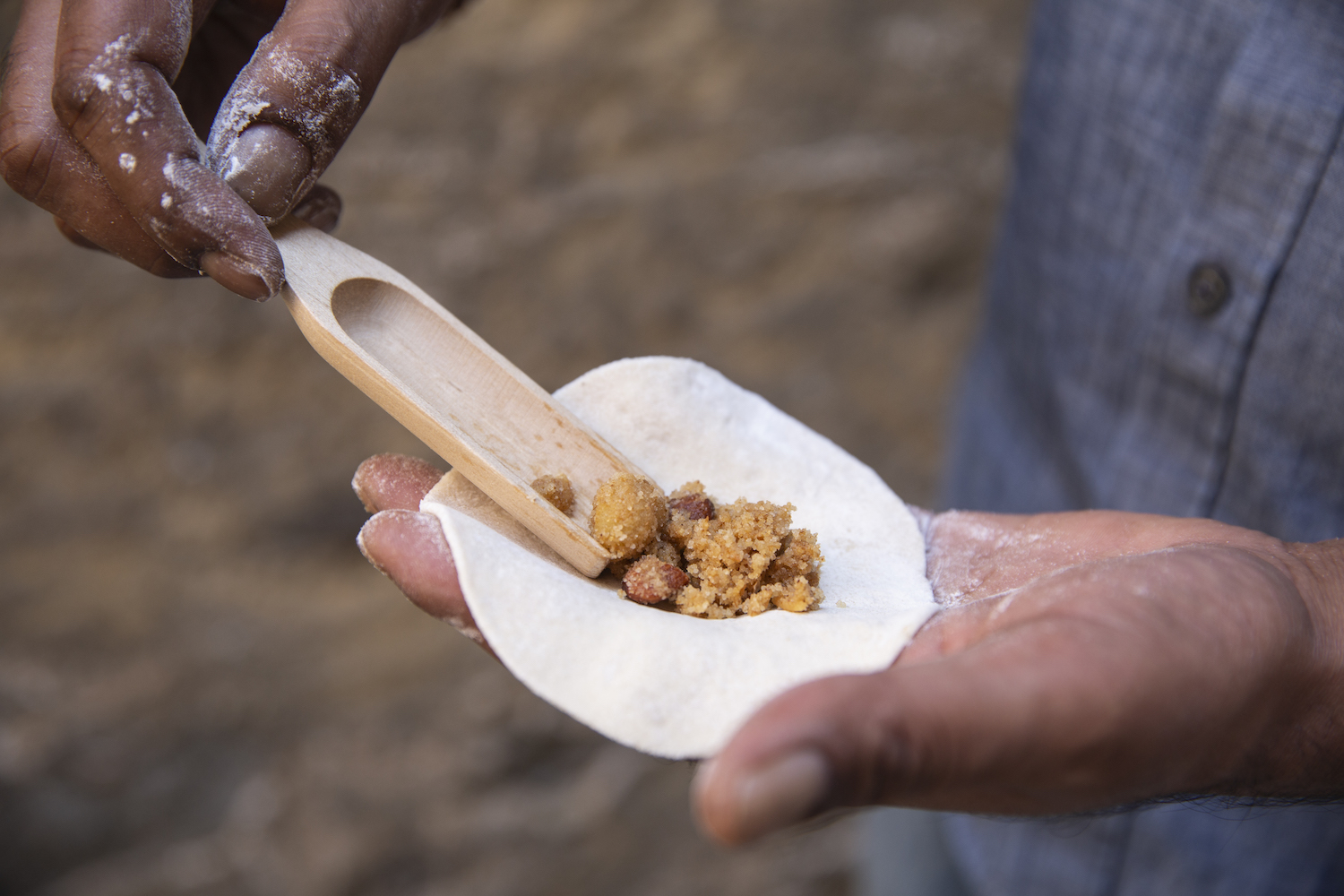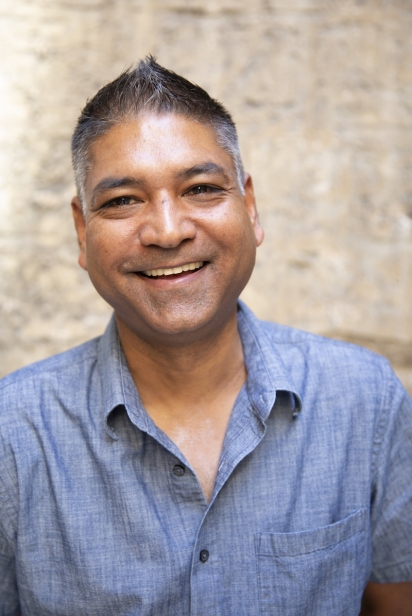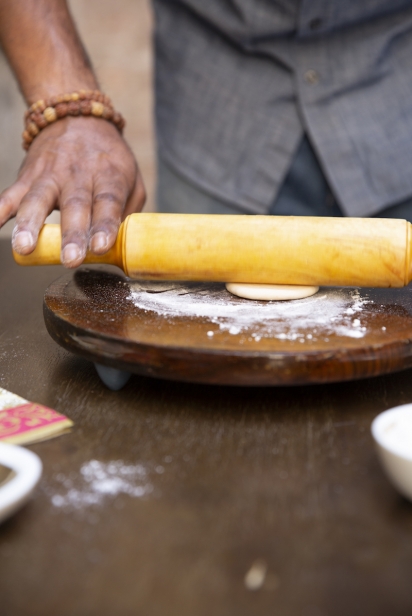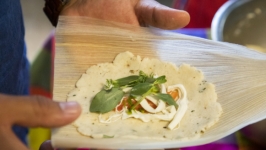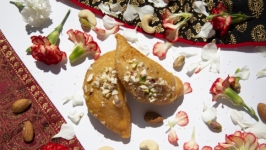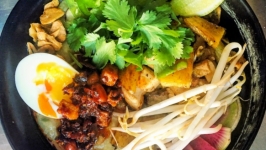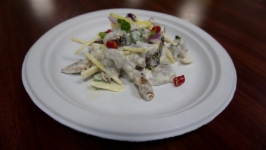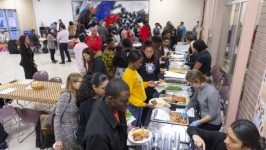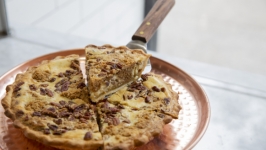Sonny Solomon, of Astoria's Kurry Qulture
"Heartbroken” is how Sonny Solomon describes his mother when he entered the restaurant industry some 20 years ago, first as a dishwasher and then a waiter. A nurse, she had hoped he would become a doctor. But the heavy tomes the pre-med students lugged were a turnoff for young Solomon. Today all of his friends are doctors, but “restaurants are more fun,” he says, especially for his adventurous, curious nature.
It took time, however, to convince his parents that in the United States, restaurant servers are not looked down on as uneducated and poor, as they are in India. When he took his parents around to New York City restaurants, “they had never seen those kind of places back home. It’s a whole different level.”
Solomon’s noted 4-year-old Astoria restaurant, Kurry Qulture, is now one of those places. A hip and friendly spot on a lively stretch of 30th Avenue, it features complex, unique (not to mention tasty) riffs on regional Indian fare. And come December, his Christmas traditions are a mix of Indian and Western, mirroring his restaurant and reflecting his personal journey.
Solomon arrived in New York from India in his early 20s, by way of Cyprus, where he studied hotel management. He found the restaurant scene more appealing, though, and began to work his way up, eventually landing at Sir Terence Conran’s Guastavino’s under chef Daniel Orr. “He was the first person in my life who changed my concept about food,” Solomon says.
He learned much about the business and hospitality from Orr (food presentation, serving techniques, wine and spirits) and was inspired by Orr’s passion; it helped him form a vision for his future. “With Indian food [in the United States], the places were depressing. They knew how to cook, but they didn’t have the knowledge about hospitality. I thought, ‘One day I’m going to open up something with a very different scene than what people are accustomed to with Indian dining.’”
Following stints with top chefs like Jean-Georges Vongerichten (at Spice Market and Mercer Kitchen), Geoffrey Zakarian (Town) and Terrance Brennan (Artisanal Fromagerie & Bistro), in 2004 Solomon partnered with Hemant Mathur on Devi, the first Michelin-starred Indian restaurant in America, and then again in 2011 on Tulsi, another Indian fine-dining spot that also earned a Michelin star (both restaurants have since closed). When he found a space in Astoria, where he’s lived since 2000, he saw the potential to open an upscale Indian restaurant in Queens. “I wanted to bring a little hipness to the Indian food scene.”
The restaurant’s serene, sun-dappled back patio doesn’t feel too far from Solomon’s bucolic early childhood in a Punjab village called Jamalpur. He recalls classes held under the shade of trees, dipping bamboo into ink to write on wooden plaques. He affixed string to nightingales’ legs to keep them as pets; when his father freed them, sticks sufficed as toys. Farms spread as far as he could see (Punjab is well-known for agriculture), ripe for picking vegetables, all in season. He bathed cows in ponds, fed goats and made loaves of their dung to fuel outdoor clay stoves. In Jamalpur, surrounded by the freshest ingredients imaginable, his palate formed.
“I used to eat a lot of butter and drink a lot of milk—and I used to steal a lot of jaggery,” he smiles, referring to the region’s caramel-like sugarcane sweets.
Solomon is tall, serious and distinguished, with salt-and-pepper hair. He speaks slowly, thoughtfully, with a deep voice, occasionally gesturing to reveal a cross tattoo on his forearm surrounded by the words Love, Hope and Faith. (He goes to church every Sunday, just a few blocks from the restaurant.)
Around age 5, his family moved to the big city of Ludhiana, where his parents worked at a Christian hospital. He remembers clearly the first meal he ever made: vegetable fritters, at 8 years old, prepared for his hungry younger brother while both parents were working.
His mother was understandably upset about a child maneuvering hot oil on a kerosene stove but also proud that he had fed his brother. She began to teach him to cook after school: dal and rice was among his early repertoire, in addition to cutting vegetables and going to the market for spices and meat. During summer vacations at his grandparents’ house in the mountains, aunts taught him to make his favorite chutneys and uncles demonstrated how to clean fish and meat. “I grew up in a family who loved to eat and throw parties,” Solomon says.
And the holidays were a full month of festivity. “Christmas was the best time of the year for us, man.” He recalls singing carols at neighbors’ homes for nearly two weeks (he would shake the chimta, a cast-iron instrument with jingles), in addition to decorating the church, watching nativity plays and eating peanuts and sugar candies by a huge campfire built by the hospital. Christmas meant homemade sweets from every family, accompanied by tea. “Anytime you go to somebody’s house, tea’s the first thing they offer you.”
Christmas Eve and Day were two days of nonstop celebration: going to church, wearing new clothes, lunch at his grandmother’s house and then dinner at his own house, with some 30 family members and neighbors. “If they show up, you feed them” he chuckled.
Non-Christians were also welcome (Christians compose only about 1% of the population in Punjab, with Sikhs being the majority and Hindus nearly 40%). “In India, [it] didn’t matter if you’re Hindu or Sikh, everybody became a part of Christmas.” He remembers going to gurdwaras with Sikh friends, and non-Christian friends accompanying him to church; they celebrated each other’s festivals, trying new foods at their homes. “We never thought about religion. Religion was about food.”
Christmas Eve was the day his family made sweets, which were then exchanged on Christmas Day with other families. Besides millet breads and rum cakes, Solomon’s mother made an excellent gujia, a sort of sweet empanada made of flour and stuffed with semolina, seven kinds of nuts and sugar. In India, he notes, you’d have to visit many different shops to assemble all the ingredients—not just one supermarket stop.
Here in New York City, Solomon takes his children (Ishaan, 9, and Anushka, 4) around to see the Fifth Avenue Christmas decorations and the Rockefeller Center tree. A buffet-style feast feeding up to 80 is held at his uncle’s house, with gifts, Bollywood music blaring and carols at midnight. Everyone stays over, and in the morning he rouses them with a hearty American breakfast.
He admits Christmas here is not quite the same as when he was growing up in India. “The energy we had in India was totally different. It was very high energy. We’d have carol singing for days and days. Every night you’d be going out to somebody’s house, eating all those sweets. Here, it’s very only-in-the-family. In India, it was more like a community thing.”
Does he miss it? “Not anymore. My life is a party here. The restaurant business—every night is a party.”
Sonny Solomon | @sonnysolomon
Kurry Qulture | @kurryqulture
Guastavino’s | @guastavinosnyc
Spice Market | @spicemarketglobal
Mercer Kitchen | @mercerkitchen


